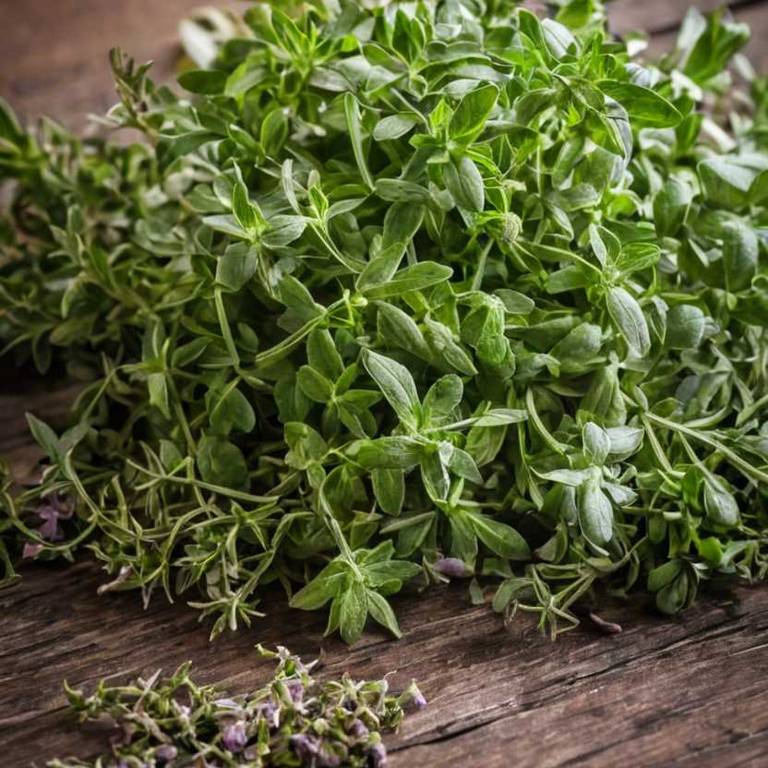By Leen Randell
Updated: Jul 20, 2024
10 Medicinal Constituents Of Thymus Vulgaris (Thyme)

Thymus vulgaris has active constituents such as carvacrol, thymol, and borneol, which exhibit antimicrobial, anti-inflammatory, and antiseptic properties.
These constituents contribute to thyme's ability to combat respiratory infections, wounds, and skin conditions.
For instance, carvacrol's decongestant properties can help alleviate coughs and congestion, while thymol's antiseptic properties can aid in wound healing and skin protection.
This article explains in details the 10 best active constituents of Thymus vulgaris.
1. Thymol
Thymus vulgaris thymol is a bioactive compound extracted from the leaves of the plant.
It has been used for centuries in traditional medicine and aromatherapy due to its antimicrobial, antiseptic, and anti-inflammatory properties.
Thymol has been shown to be effective against a range of microorganisms, including bacteria, viruses, and fungi, making it a valuable natural ingredient for personal care products, food preservation, and wound healing applications.
2. Carvacrol
Thymus vulgaris carvacrol is a phenolic compound extracted from the essential oil of the plant.
It has been traditionally used for its antimicrobial and anti-inflammatory properties, making it effective against various bacteria, fungi, and viruses.
Carvacrol has also been shown to possess antioxidant and anticancer activities, rendering it a potential therapeutic agent in medicine.
3. Γ-terpinene
Thymus vulgaris γ-terpinene is a monoterpene compound found in the essential oil of this herb.
It is a major constituent of thyme oil and has been reported to possess various biological activities, including antimicrobial, antioxidant, and anti-inflammatory properties.
γ-Terpinene has also been shown to have insecticidal and larvicidal effects, making it a potential natural pest control agent.
4. P-cymene
Thymus vulgaris p-cymene is a chemical compound found in the essential oil of this herb.
It is a monoterpene hydrocarbon that is responsible for the distinctive aroma and flavor of thyme. P-cymene has been traditionally used in folk medicine to treat various ailments, including respiratory issues and digestive problems.
Its antiseptic properties also make it effective against bacteria and fungi, making it a popular ingredient in natural remedies and cosmetics.
5. Α-pinene
Thymus vulgaris α-pinene is a bioactive compound found in the essential oil of this herb.
It is one of the main constituents of thyme oil, responsible for its pungent and refreshing aroma. α-Pinene has been shown to possess numerous therapeutic benefits, including antimicrobial, antioxidant, and anti-inflammatory properties.
It also exhibits insecticidal and repellent activities, making it a valuable component in traditional medicine and perfumery practices.
6. Camphene
Thymus vulgaris camphene is a natural compound extracted from the leaves of the plant.
It is a monoterpene, which is a type of organic compound found in plants. Camphene has been used for centuries in traditional medicine due to its antimicrobial and anti-inflammatory properties, making it effective against various infections and conditions such as bronchitis, asthma, and arthritis.
Additionally, camphene has also been used as an insect repellent and a preservative in food products.
7. Borneol
Thymus vulgaris borneol is a type of sesquiterpene alcohol that is commonly found in the essential oil of the herb.
It is responsible for many of thyme's therapeutic and aromatic properties, including its antiseptic, anti-inflammatory, and antimicrobial effects. Borneol has been traditionally used to treat a range of ailments, from skin conditions and wounds to respiratory issues and digestive problems.
Its unique scent and medicinal properties make it a popular ingredient in natural remedies and aromatherapy blends.
8. Terpinen-4-ol
Thymus vulgaris terpinen-4-ol is a sesquiterpene alcohol that is widely present in the essential oil of the plant.
It is responsible for the characteristic aroma and flavor of thyme and has been shown to possess various biological activities, including antimicrobial, antifungal, and antioxidant properties.
Terpinen-4-ol has also been found to have potential therapeutic applications, such as wound healing, respiratory support, and insect repellency.
9. Linalool
Thymus vulgaris linalool is a natural monoterpene compound responsible for its characteristic aroma and flavor.
Linalool is the primary constituent of thyme essential oil, accounting for approximately 20-40% of its composition. This fragrance molecule has been traditionally used in aromatherapy to promote relaxation, reduce stress and anxiety, and improve sleep quality.
It also exhibits antimicrobial properties, making it effective against various microorganisms.
10. Geraniol
Thymus vulgaris geraniol is a natural essential oil extracted from the leaves and stems of the plant.
This oil has been used for centuries in traditional medicine to treat various ailments, including respiratory issues and digestive problems. Geraniol possesses antibacterial and antifungal properties, making it effective against infections and inflammation.
Its sweet, floral aroma also makes it a popular ingredient in perfumes, candles, and aromatherapy products.